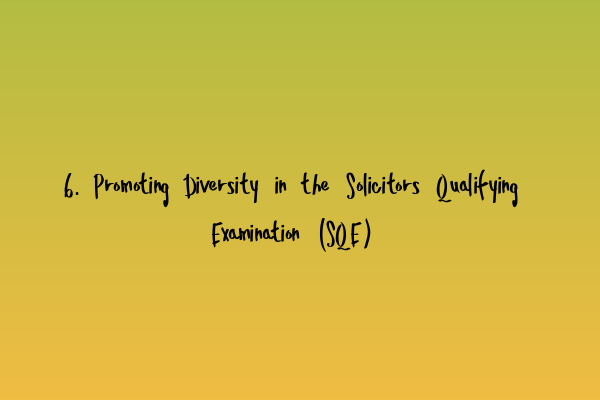As a solicitor, it is essential to promote diversity in the Solicitors Qualifying Examination (SQE). The SQE is a new two-part examination that will replace the current Legal Practice Course (LPC) as the route to qualification as a solicitor in England and Wales. With the introduction of the SQE, it is the perfect opportunity to address the lack of diversity in the legal profession and create a more inclusive and representative body of solicitors.
The Importance of Diversity
Diversity in the legal profession is crucial for several reasons. Firstly, it ensures that different perspectives and experiences are represented, which leads to more innovative and effective legal solutions. Secondly, it promotes equal access to justice, as individuals from diverse backgrounds may face unique legal challenges that require specialized knowledge and understanding.
In order to promote diversity in the SQE, it is necessary to address the barriers and challenges faced by underrepresented groups. These groups may include individuals from low-income backgrounds, ethnic minorities, individuals with disabilities, and those from non-traditional career paths.
1. Widening Access
One way to promote diversity in the SQE is by widening access to preparatory courses. Preparatory courses are essential for candidates to succeed in the examination, but they can also be a barrier for individuals from disadvantaged backgrounds due to their cost. Offering scholarships or reduced fees for preparatory courses can help level the playing field and provide equal opportunities for all candidates.
SQE 1 Preparation Courses and SQE 2 Preparation Courses offer comprehensive and affordable options for candidates preparing for the SQE.
2. Diverse Study Materials
Providing diverse study materials that reflect the experiences and perspectives of different groups can also contribute to promoting diversity in the SQE. It is important to ensure that the materials used for preparation are inclusive and representative of different backgrounds, cultures, and perspectives.
For candidates looking for practice questions and mock exams, SQE 1 Practice Exam Questions and SQE 1 Practice Mocks FLK1 FLK2 offer a comprehensive range of resources.
3. Mentorship and Support
Mentorship and support programs can be highly beneficial in promoting diversity in the SQE. Pairing candidates from underrepresented groups with experienced solicitors who can provide guidance and support can help bridge the gap and create a more inclusive and supportive learning environment.
4. Collaboration with Diversity Organizations
In order to effectively promote diversity in the SQE, collaboration with diversity organizations is crucial. By partnering with organizations that focus on promoting diversity and inclusion in the legal profession, such as the Black Solicitors Network or Disability Lawyers Association, the SQE can gain valuable insights and develop strategies to address the unique challenges faced by underrepresented groups.
5. Inclusive Assessment Methods
The SQE should strive to implement inclusive assessment methods that assess candidates’ skills and abilities in a fair and unbiased manner. This can include incorporating practical assessments that allow candidates to demonstrate their understanding and application of legal principles in real-life scenarios.
6. Regular Monitoring and Evaluation
Regular monitoring and evaluation of diversity statistics within the SQE can help identify areas for improvement and track progress. By collecting data on the demographics of candidates and successful applicants, the SQE can measure the effectiveness of diversity initiatives and make necessary adjustments to ensure continued progress.
The introduction of the SQE provides a unique opportunity to promote diversity in the legal profession. By implementing initiatives that address the barriers and challenges faced by underrepresented groups, the SQE can create a more inclusive and representative body of solicitors.
For more information on the SRA SQE Exam Dates, please refer to SRA SQE Exam Dates.
